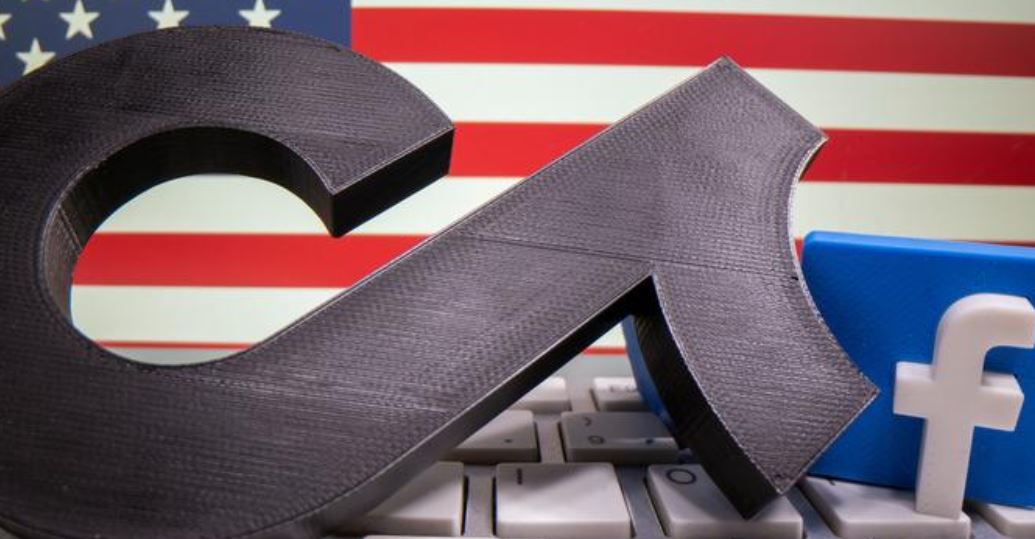
A 3D printed Tik Tok and Facebook logo are placed on a keyboard in front of U.S. flag in this illustration taken October 6, 2020. Picture taken October 6, 2020. REUTERS/Dado Ruvic/Illustration/File Photo
A voter registration project is compensating Latina mothers for social media posts about climate change, while a political action committee (PAC) is paying eight TikTok influencers for videos to help get the youth vote out for Democratic presidential candidate Joe Biden.
The tactic of paying so-called influencers and publishers for creating and posting political content is taking off across social media sites. While Facebook Inc FB.O and Alphabet Inc's GOOGL.O Google are putting various pauses on election ads in the days around the U.S. vote on Tuesday, sponsored content posted by social media creators is still permitted on their platforms.
“We’re developing our plans right now around how to message during that time,” said Christian Tom, head of digital partnerships at the Biden campaign. “I suspect that digital partners broadly ... will be at the heart of how we address that communication need.”
Political groups and strategists say they work with paid micro-influencers - people with a few thousand engaged social media followers - who post on platforms including Chinese-owned video app TikTok, YouTube and Facebook-owned Instagram and messaging service WhatsApp. Groups compensating micro-influencers and social publishers for content this election have included progressive PAC NextGen America, conservative student group Turning Point USA and Democratic presidential campaigns.
But social media researchers say the practice, which has scant federal regulation, blurs lines over what constitutes a digital ad and raises transparency questions.
A TikTok spokeswoman said its ban on political advertising also prohibited paid political influencer content. A spokesman for Twitter Inc TWTR.N, which also does not allow political ads, said its ban did not.
Under pressure to improve transparency after the 2016 election, several social media companies launched public databases to track the political ads they are paid to run. But sponsored content has not been included in these efforts.
“Facebook will quibble that this is something different from an ad because Facebook is not being directly paid for it,” said Laura Edelson, a researcher at New York University who works on a political ad transparency project. “But this is an ad.”
“Branded content is different from ads on the platform – we don’t receive any money for organic branded content posts,” a Facebook spokeswoman said.
She said that as Facebook does not have visibility into financial relationships taking place off its platforms, it requires creators to label such posts using its tools.
Researchers can use Facebook’s CrowdTangle tool to search for sponsored political content that uses these labels but say it is difficult to discover and analyze. Facebook also provides a live display for the public to see some of this content, but the spokeswoman said it does not plan to add any additional data.
On Facebook, Biden’s campaign is running paid partnerships with pages ranging from left-leaning meme pages like The Other 98% to The Pet Collective, a home for animal videos. It is also working with individual influencers, though it says these efforts are unpaid.
The Trump campaign did not respond to questions on whether it had run any paid social-media partnerships. Facebook’s CrowdTangle analytics tool also does not show any posts labeled as paid partnerships with the campaign.
Payment for political posts can range from $10 to several thousand for a post, researchers and people involved in digital campaigns told Reuters.
“It would seem a little sleazy not to compensate them,” Curtis Hougland, the chief executive of Main Street One, a left-leaning political firm. Hougland said Main Street One has a network of six million micro-influencers, from truck drivers to coal miners, that it matches with paid social-media campaigns for unions, political non-profits and candidates.
PAID POSTS
Inconsistent disclosure practices and a lack of transparency tools make it difficult to track political paid partnerships online.
Tyler Bowyer, chief operating officer of Turning Point USA, said his group created a large network of micro-influencers, including those it compensates for work including sharing or producing content, but said it does “very few official paid partnerships.” The conservative youth organization was recently linked with a network of paid teenagers posting messages without disclosures.
On TikTok, influencers paid by the pro-Biden political action committee The 99 Problems to create content for a new account called the ‘@houseof_us,’ with 19,000 followers and 79,000 likes, have not so far used disclaimers like #ad or #sponsored on the posts.
“We’re going to these creators and asking them to make their own content supporting something that they believe in, we’re just asking to pay for their time,” said Katie Longmyer, one of the PAC’s co-founders.
A TikTok spokeswoman said sponsored content disclosures should be visible in a video’s caption. She said TikTok removes undisclosed paid political content when it becomes aware of it.
While the Federal Trade Commission requires social media influencers and creators to clearly label sponsored posts, the Federal Election Commission (FEC) governs political ads.
FEC rules stipulate public online communications advocating for or against a candidate for a fee must include a disclaimer to inform who paid for the content, but it has not laid out specific guidelines for social-media influencers.




No comments :
Post a Comment